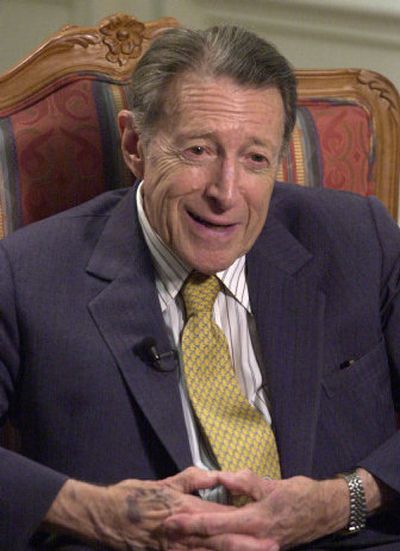Caspar Weinberger dies at age 88

WASHINGTON – Caspar W. Weinberger, who oversaw the Pentagon’s biggest peacetime spending increase as President Reagan’s defense secretary and later was indicted for his role in the Iran-Contra affair, died Tuesday. He was 88.
Weinberger had been hospitalized in Bangor, Maine, with a high fever and pneumonia brought on by his age, according to his son, Caspar Weinberger Jr.
Weinberger served as President Nixon’s budget director and was given the nickname “Cap the Knife” for his efforts to slash government spending. Yet Weinberger’s best-known role may have been as Reagan’s defense secretary, when the classic cold warrior presided over a cumulative $2 trillion in military spending.
Determined to ensure U.S. strategic strength to counter the Soviet Union, Weinberger pushed Congress to fund such programs as the Strategic Defense Initiative, Midgetman and MX missiles, B-1B bombers and stealth aircraft.
But it was also during this time that reports surfaced of excesses at the Pentagon, from $600 toilet seats to $400 hammers. Cartoonists had a field day portraying Weinberger with toilet seats around his neck.
Supporters contended the defense buildup helped cause the collapse of the Soviet Union.
“His legacy is a strong and free America, and for this and for a lifetime of selfless service, a grateful nation thanks him,” former first lady Nancy Reagan said Tuesday.
A lifelong Republican, Weinberger’s early interest in politics and government – sparked by his father, a lawyer – led him to the Pentagon and White House.
But his work also led to a trouble – federal felony charges stemming from his alleged role in the sale of weapons to Iran to finance secret, illegal aid to the Nicaraguan Contras.
The “arms-for-hostages” affair poisoned the closing years of Reagan’s administration and permanently stained the reputations of the insiders involved.
In one of the first President Bush’s final official acts after his 1992 loss to Bill Clinton, he granted Christmas Eve pardons to Weinberger and five others accused in the affair. Bush was Reagan’s vice president.
Weinberger, 75 at the time, had been scheduled to stand trial in less than two weeks on charges that he concealed thousands of pages of his handwritten notes from congressional investigators and prosecutors.
He’d earlier rejected independent counsel Lawrence Walsh’s plea-bargain offer to testify against his longtime friends and colleagues – including Reagan – and plead guilty to a misdemeanor.
Weinberger had said he was innocent of all the charges and considered the indictment a political attack.
In 1989, Weinberger, a self-described “frustrated newspaperman” – he was president of the Harvard Crimson – joined Forbes to become the magazine’s fourth publisher. In 1993 he was named chairman of Forbes Inc.
Besides his son, Weinberger is survived by a daughter, Arlin Weinberger, and his wife of 63 years, Jane. All three were at his bedside when he died.
A statement from Weinberger’s family said funeral arrangements at Arlington National Cemetery are pending.